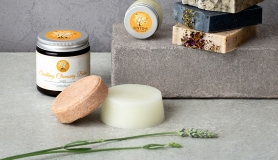A woman’s body is often optimally healthy during pregnancy and this state of health can be encouraged through a good diet and holistic therapies. There are natural ways to approach birth that work in harmony with the mother’s body and encourage the best possible experience for the baby and the labouring woman.
Pregnancy is truly a miraculous event. Eating well and looking after your body will protect you and your baby during pregnancy, birth and beyond. It is important not to treat pregnancy as an illness. Carrying on with everyday life and getting daily exercise can help to ensure an easier birth as your body will be more supple and the muscles more able to support your body during childbirth.
Many women feel anxious at the thought of birth. In our society we often live far from family members and birth wisdom is not often passed down through the generations as it is in tribal cultures. It is a good idea to seek support from other women, your partner or a supportive group. They should be people with whom you can share not only your fears but also your hopes and aspirations for the birth. A good place to access this sort of support is though an active birth or Birthlight class where you can also learn yoga techniques to help your body open up for labour. >>
Herbs
Plants have been used since time immemorial for medicinal purposes. Herbs can be used to treat a wide range of common ailments. It is advisable to seek advice from an herbalist as some plants have powerful effects and must be used with caution. Calendula is a wonderful healer and a few drops of calendula infused oil can be added to a warm bath to aid healing and soothe soreness.
Another way to use the healing power of plants is in the form of teas. You can make your own using dried leaves and roots, and occasionally roots. Some are particularly useful in pregnancy. For example, red raspberry leaf tea is good for later stages. It helps to tone the uterus and has useful healing properties. Some herbalists recommend three cups a day in the last weeks of pregnancy.
Chamomile tea is mild and allows for more restful sleep. It also aids digestion.
Nettle tea is a good all-rounder and can ease leg cramps and strengthen kidneys. It is a plant rich in iron so an excellent tonic for pregnant women, especially those suffering from anaemia.
Homeopathy
This is a holistic treatment; medicine for the whole person. Therefore, it is best to use medicines according to your constitutional type as recommended by a homeopath. However, Arnica and Ledum can be used to great effect during labour to reduce pain and prevent bruising. A homeopath can advise on treatment for nausea, digestive disorders, anaemia, high blood pressure, emotional difficulties and a variety of other conditions.
Massage
This soothing technique has been used for thousands of years to ease pains during pregnancy and assist in labour. Sweet almond oil can be used on its own, a non-scented oil that will nourish your skin or you can choose a blend that will help you to relax or energise you. Gently massaging your belly will help you connect with your baby. This is a good way for your partner to communicate with your child too. A back massage can be extremely beneficial at all stages of pregnancy and you may find a lover’s touch very nurturing and comforting.
Massaging your perineum (skin between your vagina and anus) is important preparation for childbirth and helps to prevent tearing during labour. After you have had a bath or shower the skin will be soft and supple, this is the best time to massage, and it’s best to start about six weeks before birth. Use base oil like almond or olive oil and massage inside your vagina and perineum, gently stretching the skin and preparing your body for birth. Using an opening visualisation can be a useful practice when doing this exercise.
Osteopathy:
This is based on the belief that our skeletal and organ systems are connected and that if the structure is correctly aligned, the muscles can work harmoniously and the fluids flow freely. As your posture changes during pregnancy and with the added strain on your back, osteopathy can ease unusual aches and pains. This treatment has a beneficial effect on the whole body as it improves blood flow to the organs and nerves.
Reflexology:
Different areas of our feet and hands are connected to parts of our body. Therapeutic massage of the hand or foot may be used to help heal ailments such as stress, headaches and digestive problems. Evidence also suggests that regular reflexology can make labour and birth easier.
Natural Treatments During Pregnancy
In most cases, a woman’s body is optimally healthy during pregnancy. There is a natural tendency for self-healing when minor illnesses or imbalances occur. Natural therapies can work with the body to enhance and strengthen this ability. If used appropriately, alternative medicines have no dangerous or unpleasant side effects and are safe for use in pregnancy. People respond differently to various therapies and you will probably find that some are more useful than others. It is wise to consult a skilled practitioner for initial guidance in using natural medicine during pregnancy.
Acupuncture
This therapy originated over 5,000 years ago in China and works on the basis of a vital life force or flow of energy in the body called “chi”. Chi flows through channels that are each linked to different organs and an acupuncturist uses fine needles to release blockages and correct imbalances. Most useful in pregnancy as a treatment to stimulate labour if you are overdue, or to encourage breech babies to turn. Also, acupuncture can help alleviate back pain and sickness. Consult a practitioner who has experience of working with pregnant women.
Shiatsu
Slight pressure is used to stimulate energy points and can be practised at home. A common example is the bands available from chemists, worn on your wrists to combat travel sickness. These can also help relieve morning sickness in early pregnancy. You can use this technique to help combat sickness by applying pressure to the point when needed. The point is located two finger widths down from the crease of the wrist, between the veins. Use first thing in the morning and as needed throughout the day to relieve nausea.
Aromatherapy
The use of essential oils during pregnancy can encourage relaxation, raise energy levels and restore balance. Aromatherapy oils can be used for massage, added to a warm bath or used in vaporisers. It is an effective therapy for stress- related disorders, high blood pressure, insomnia and nausea. Use a calming blend of lavender, neroli and rose during late pregnancy to help you get a good night’s sleep. Geranium can also be used with jasmine as a mood enhancer. A few drops of ginger or peppermint oil on a tissue may help relieve nausea. Some advise against using aromatherapy in the first trimester. >
MAKE YOUR OWN
BATH BLEND
WHAT YOU NEED:
100ml sweet almond or apricot kernel oil
5 drops each of rose, neroli and lavender
WHAT TO DO:
- Place all the ingredients into a dark bottle and shake gently to mix.
- Add a couple of capfuls to a warm bath for a relaxing, soothing bath. This is suitable for use in later pregnancy.
CALENDULA OIL
WHAT TO DO:
- Take a handful of dried flowers.
- Place them in a glass jar with a lid and cover completely with sweet almond oil or apricot kernel oil.
- Seal tightly with the lid and leave to infuse.
- It will need to be shaken every day for 4 to 8 weeks. When the oil has turned golden, strain through a piece of muslin and bottle it in a dark glass bottle. You can keep it in the refrigerator to help it last longer.
- As well as soothing soreness and helping to prevent stretchmarks, this oil can also be used to treat skin conditions such as wounds, spots and sunburn.
BELLY BAND
Help keep your belly warm and protected during the later stages of pregnancy with a homemade belly band. It is also useful to extend the use of prepregnancy clothes and after your baby is born wear during breastfeeding to keep your body warm.
WHAT YOU NEED:
An old tshirt, vest or tank top that is very stretchy and fits snuggly on your body. Go for a size smaller than you would normally wear.
- Measure at least 30cm from the hem (more is better), and cut all the way round so that you have a soft band of fabric.
- You are finished! You could hem the edge by turning in 2cm and topstitching to keep it neat, but you don’t have to. Now you can wear pre-pregnancy trousers with the zipper unzipped and keep them in place with your DIY belly band.
MASSAGE OIL
WHAT YOU NEED:
30ml sweet almond oil
2 drops each rose, geranium, lavender and roman chamomile
WHAT TO DO:
Place ingredients in a dark bottle. Shake gently to mix.
Apply in long sweeping strokes across the back and backs of the legs.
COMMON PROBLEMS AND HOW TO TREAT THEM
Anaemia
Red Raspberry Leaf tea contains iron that is easily assimilated into the system. An iron-rich tonic such as Floradix is also good for treating anaemia. When eating foods that contain iron such as watercress, pumpkin seeds and oats, remember that Vitamin C, found in many fruits and green vegetables is also needed by the body to break down the iron into a usable form.
Backache
Can be caused by changes in your posture needed to accommodate the baby’s weight. Stand straight and tall and wear comfortable shoes. Yoga and Pilates can help to encourage a better posture.
A good massage oil for backache during pregnancy is: two drops each of rose, geranium, lavender and roman chamomile combined with 30ml of base oil, such as sweet almond oil.
Bleeding Gums
Increase your Vitamin C intake. Red raspberry leaf tea is also good for treating bleeding gums. Some practitioners recommend limiting this herb to the third trimester though.
Constipation
Cut back on wheat products, eat more dried fruits and take more fluids. Some prescription iron supplements can have a constipating effect. Try an iron-rich tonic such nettle tea or red raspberry leaf tea, rich in iron. Again, some practitioners suggest using this only in the last three months of pregnancy.
Cramps
During pregnancy, cramps occur mainly in the thighs, calves and feet due to poor circulation or calcium deficiency. Eat plenty of garlic to improve circulation. A daily leg massage also helps prevent cramping at night.
Dizziness
Change position slowly so that your blood vessels have time to adjust and eat little and often.
Fluid Retention
The balance of salt and potassium in the cells causes hands, legs and feet to swell. Apis and Natrum Mur are the recommended homeopathic remedies, but it is best to consult a homeopath who will take a holistic view. Massage can help to reduce water retention in the legs.
Indigestion
Drink fennel tea and avoid rich, spicy or fried foods. Yoga and Pilates can alleviate the pain caused by pressure on the diaphragm.
Insomnia
Discomfort near the end of pregnancy can make sleep difficult. A teaspoon of honey and cider vinegar in warm water can help you sleep better. Also try celery juice, which is good for sleep problems. Daily exercise, preferably outdoors is a real tonic for sleeplessness. Wet cotton socks worn with a pair of woollen socks on top can induce sleep. Take little naps during the day and avoid watching TV before you go to bed. In fact, switch off any electrical equipment at the wall in your bedroom. Also, make sure your bedroom is well ventilated.
Morning Sickness
Ginger is very good for nausea. Try making a cup of ginger tea by steeping fresh ginger in hot water for ten minutes.
Try homeopathic remedies; Ipecac for continued nausea not relieved by vomiting; Sepia if the nausea is made worse by the smell of thought of food; Nux Vomica for nausea that is worse in the morning and Pulsatilla for nausea that comes on in the evening.
When you have to travel long distances in pregnancy wear a pair of travel bands on your wrists, which work on acupressure points and are available from most good health food stores or chemists. Or simply apply pressure to these points yourself at regular intervals.
Boost your levels of Vitamin B6. This is found in bananas, cereals, lentils and fish.
Pelvic Pain
Massage the thighs and pelvic area quite firmly to relieve muscle pain and tightness.
Piles
Caused by a body under stress through lack of nutrients.
Apply an ice-cold witch hazel compress on gauze over the swelling.
Stretch Marks
Fine red lines that will turn silver eventually, caused by the skin stretching.
Apply Aloe Vera gel direct from the succulent leaves onto your belly, breasts and thighs to prevent stretch marks.Food containing zinc, such as sunflower and pumpkin seeds can help to boost your skin’s elasticity. Or try moisturizing your growing bump with coconut oil (add a few drops of rose essential oil).
Varicose Veins
A witch hazel compress will ease varicose veins. Lemon juice can also be used.
Thrush
This is due to extra pressure on the immune system during pregnancy.
Chamomile, fennel and thyme can be used to treat thrush with their antifungal properties. Place a few drops each of chmomile, thyme and fennel essential oils into a bowl of warm water. Soak a cotton cloth and apply as a compress to the vagina. Natural yoghurt can also be applied. Eat plenty of raw foods, especially garlic. You can also massage olive oil liberally around the vulva and labia. Wear cotton underwear and avoid tight fitting clothes. Cut out sugar and other sweeteners such as honey and molasses as sugar compromises the immune system.
Tiredness
Have a warm bath with a few drops of jasmine, ylang ylang or lavender. Yoga and swimming are perfect exercise for pregnancy and can energise you when you are feeling exhausted. They will also ensure a good night’s sleep.







